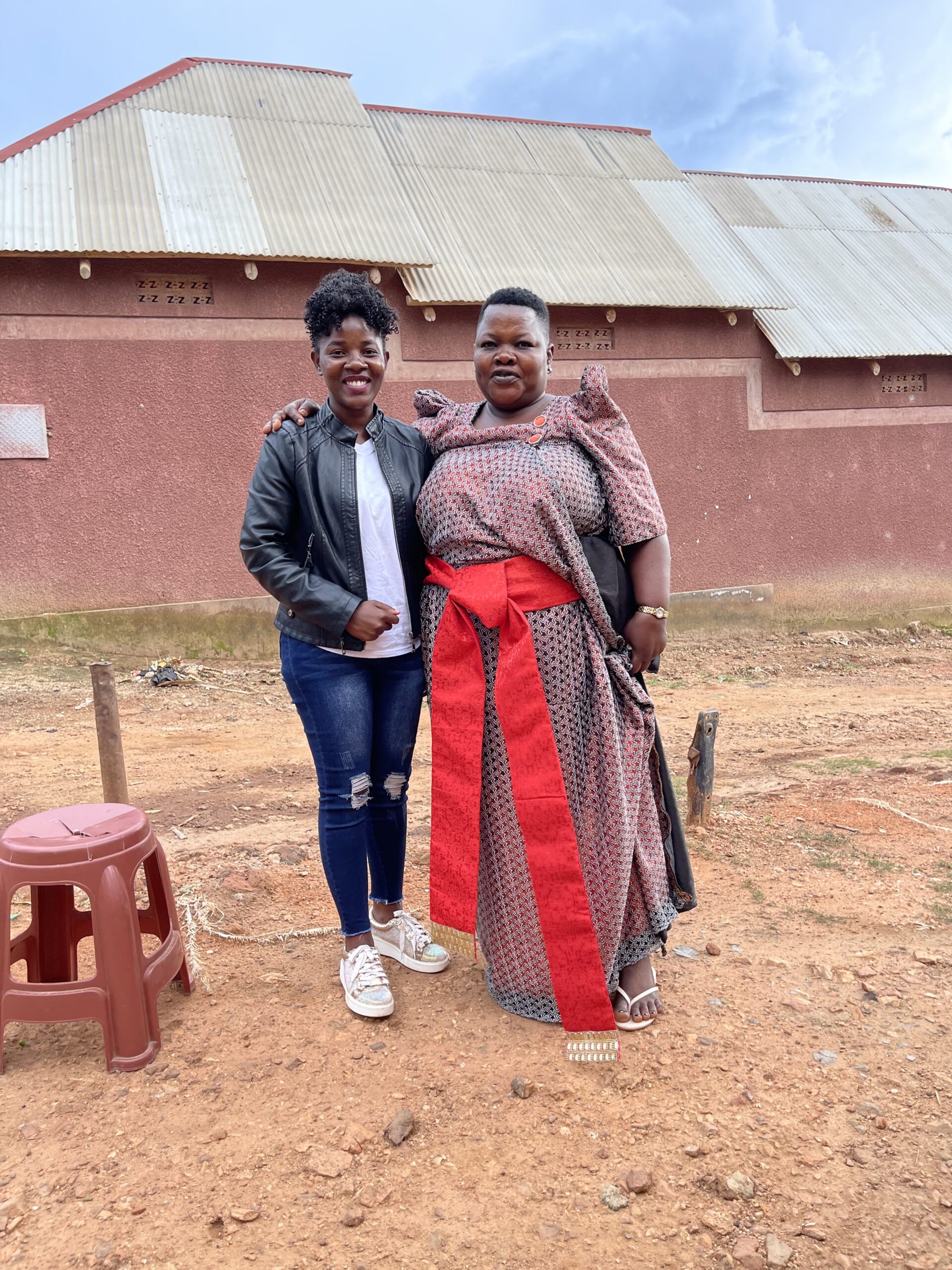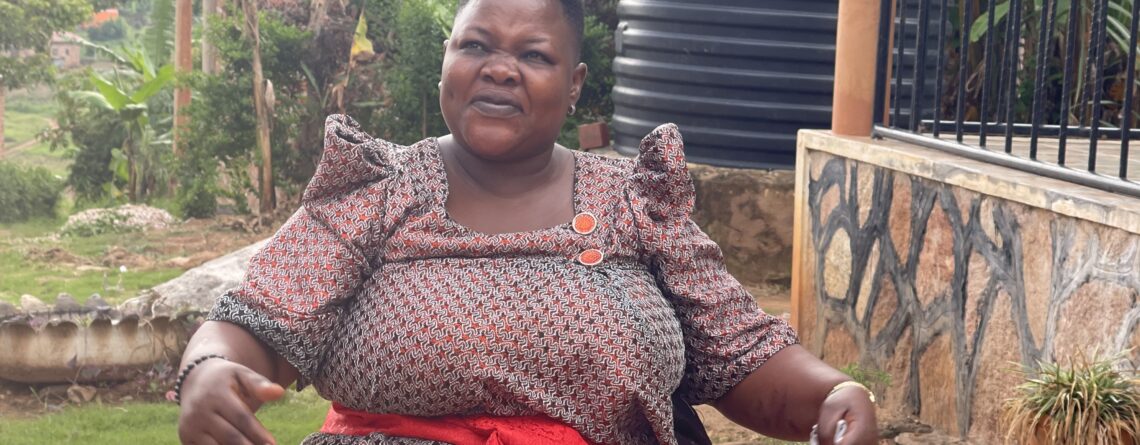How Fistula Stigma Nearly Ended Nabunnya’s Life

By Culton Scovia Nakamya
“Madam, your baby could not make it. She was too tired to live long to see the world,” Eseza Nabunnya, mother of six reminisces the statement from one of the nurses at Kawempe Referral Hospital knocking her off balance after a long wait for her seventh born.
If news of the death of her child had not dealt her enough blow, Nabunnya would later realize that she could neither hold her urine nor the feces. That evening, she says, she would witness a free flow of her own wastes down her thighs, a spectacle she says sent a cool chill through her nerves.
“I knew my life had ended. That moment was the most embarrassing part of my life and I begged God to open up the ground to swallow me at once,” she narrates with a husky voice.
The day that had kicked off with morning normal labour pains would later begin her six months gloomy journey of pain, agony and rejection due to the double tragedy that she had been subjected to after what she calls reckless nurses’ delay to attend to her.
How it started
On June 17, 2018, Nabunnya a resident of Buwambo in Wakiso District after feeling a sharp pain in her lower abdomen, had packed up her bags and gone to the nearby Born Lucky Clinic because she knew it was time to receive her seventh bundle of joy.
She says that the midwife at the facility confirmed her suspicion and assured her that she would be able to have a normal delivery.
Hours of battling
The endurance and hours of groaning in pain lasted more than four as the midwives insisted that in a matter of time the baby would be able to pop. The pushing process took 4 hours, from 10:00pm to 2:00am.
With time, the midwives started giving-in that their continuous agitation for the weakening mother were not yielding any fruit. Owing to the fact that their facility was incapacitated to handle cesarean cases, they referred her to Kawempe National Referral Hospital. The hospital is about 25Kms away from where the clinic was.
The hustle and tussle to get means of transport to take her to the hospital were daunting in and of themselves. One hour later, they arrived in Kawempe by ambulance and was straight away taken to the theater for an operation.
It is until this point that the doctors broke the tragic news of the passing of the child to the profusely bleeding mother. A gynecology’s report seen by this publication indicated that the delays to access proper medical care and the prolonged delivery were the underlying factors.
Few hours later, she realized she did not only lose the baby in the process but her bladder had also been damaged, leading to urinary and fecal leakages.
Long journey of dealing with obstetric fistula
Little did she know, she was headed for the worst days of her life. Nabunnya didn’t find an immediate solution to the fecal and urinary leakages for months. The first burden started with affordability of adult diapers, spending Shs16,000 daily.
Friends, relatives and community members who visited to extend condolences for the lost baby turned to be her worst nightmare. She carried with her a terrible odur that even her close relatives could hardly stay close to her. She chose to keep indoor, to avoid stigma.
“Some people said I had been bewitched; others rumored I had HIV but living in denial. How can someone smell like that? Many of them kept asking me,” Nabunnya narrates weeping uncontrollably.
The insinuations got Nabunya more desperate to the extent that she was forced to seek all kinds of remedies including; witchcraft herbal medicine and when all that did not work, she went back to medical doctors but her chase was too good to last. She gave up.
“I got depressed and started mental health medical treatment. I wished I could die because everybody was laughing at me. Staying indoors wasn’t enough because home nearly turned into a tourism destination, scores coming on a daily basis to see a woman in a strange condition. This affected my family a lot”. She recalls.
Nabunnya started getting suicide thoughts. She preferred a slow one by starving herself, in a desperate move to get relieved of the pain, leaking and the foul smell.
At the time of the incident, Nabunnya was weighing 90Kgs but after this whole, she had grown lean to 35Kgs. Her retail shop closed because she had used the capital to buy diapers. She gave up on diapers and started using towels. This hygienically worsened the situation. Her husband shunned her.
Enters the good Samaritan
About six months later, one person that never gave up on her, Florence Ndagire reached out with an idea.
Ndagire, visually impaired, had heard over the radio of signs of fistula and a medical camp in Masaka district for free surgeries. She suspected her Friend was battling Fistula. Nabunnya first rejected the proposal but later accepted. Ndagire catered for her transport bills so she can seek medication.
She made it to Masaka, at Kitovu Hospital. Indeed, a diagnosis confirmed obstetric Fistula and a surgery was recommended. However, due to her body size, a result of malnutrition (35Kgs), Nabunnya could not receive her surgery. She needed some more weight to work out a balanced body mass index.
Nabunnya felt betrayed. She heard of a similar surgical camp at Mubende Hospital. She turned her hope to Mubende. Unfortunately, she wasn’t successful.
She returned home to embark on a weight gain journey. It took her two months of food diet to gain the recommended weight, above 50Kgs. Indeed, it worked.
She returned to Kitovu hospital in November the same year and had a successful fistula surgery. She spent two months at the facility under medical watch. Joy and hope were restored, Nabunnya fully recovered.
Fistula is a hole that develops between the birth canal and bladder or rectum. It is caused by prolonged, obstructed labor, causing urine and fecal leakage.
Uganda is ranked among African
Prolonged labor, iatrogenic complications during caesarean section, low quality medical care are the common contributing risk factors. Fistula surgeries are a rare procedure in Uganda and due to low community sensitization levels, many women suffer in silence as the public presumes it to be a curse, witch craft, while many are unaware Fistula can be repaired or treated.
Nabunnya has since chosen to be a good will ambassador, educating mothers about fistula, its prevention and treatment.
“I have since visited Kitovu hospital in Masaka, just to say thank you. But whenever I go, I hug the hospital from the entrance before extending my hugs to everyone else. I can never pay for what favors I received pus the monetary and psychosocial support I received. The community that stigmatized me, now recognizes my efforts towards fistula awareness. I thank Buganda Kingdom for sponsoring such treatment camps”. Nabunnya.
Watch Video here:
https://youtu.be/N9Dht5GkYYY


Comments (4)
Wow, such a success story, thank you for sharing it with the world.
I jus cried reading her story, obstetric fistula is so hard to talk about buh easily treatable if discovered early,m so glad she found joy again,this condition is most common among teenage mother’s whose bodies ain’t ready buh also a lapse in maternal health care,it wld b avoided if mother’s could access hospitals that can correctly evaluate them,thank u Bbeene
Thanks be to God for your recovery. Then heartfelt gratitude to the mighty BUGANDA KINGDOM who come through for many people and all those that generously contribute towards such activities especially through the Kabaka’s birthday run and other ways.
Sabasajja Kabaka awangaale
We bless the Lord